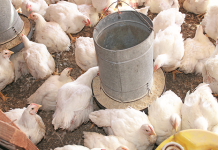It keeps getting worse. Despite being fed a constant diet of assurances that the government is clamping down on corruption, the opposite seems to be happening. Auditor-General Terrence Nombembe, interviewed on television recently, said that the ability of the government to spend and keep track of its finances had stagnated – and backed up his claim with depressing figures.
The number of government entities that received clean audits had declined to just 117 out of 536 entities – just 22%. This means that a staggering 152 fewer entities received clean audits than in 2009/10. It came as no surprise to hear that among the worst performers in this regard were the Departments of Education, Health and Public Works. According to Nombembe, it is mostly the procurement system in the entities that remains questionable and lacks accountability. This is hardly a revelation either.
A month ago, I listened to Dr Kgabi Mogajane, the North West Department of Agriculture and Rural Development HOD, at an event in Zeerust admitting that millions of rands had been wasted on consultants and service providers. This was money, she emphasised, that should have ended up assisting farmers. Just weeks after Dr Mogajane’s admission, the AG’s office confirmed that the government had spent R33,5 billion on consultants in the past three years.
According to Nombembe, the government spent these billions on consultants because people without the relevant skills were employed. In addition, contracts were awarded to companies linked to government officials. In the past financial year, contracts worth R438 million at 47 government entities were awarded to suppliers with links to officials in these same entities, while contracts worth R141 million at 42 entities went to companies linked to officials’ family members. This pattern will continue until it is properly addressed by the authorities.
Just a month after Dr Mogajane spoke at the event, she was suspended and put under investigation. The department has kept mum on why. I cannot confirm that Dr Mogajane was targeted for her statement but it certainly looks as if the moment someone in government starts asking awkward questions, efforts are made to silence the whistleblower.
Sowetan newspaper reported recently that Scopa’s chairperson in North West, Hlomane Chauke, began fearing for his life after a recorded telephone conversation between a departmental spokesperson and an unknown woman came to light. The conversation evidently took place after Chauke had asked questions about the Social Development MEC spending R174 000 of public money on friends and other officials to attend the 2012 Mangaung ANC conference.
The spokesperson tells the woman that Chauke must be stopped and he (the spokesperson) would be willing to pay to make this happen. Whether or not these incidents took place exactly as described, the overall message is clear: it doesn’t pay to disturb the pigs at the trough.
Now what?
One of the biggest worries is that the government appears to have no concrete plan to eradicate the problem of nepotism, despite the fact that it is sucking government dry. While plans seem to be afoot to prevent officials from doing business with the government, nothing has been said about stopping the ruinous practice of appointing badly skilled people simply because they have the right family connections. Until this is addressed, service delivery will continue to suffer.
So, Ms Sisulu, while you are busy devising strategies to stop government officials from awarding themselves government contracts, please attend to the other – and arguably more serious – part of the problem. Get rid of all those hopelessly incompetent wives, husbands, uncles, aunts and cousins. And don’t forget the concubines, as COPE president Mosiuoa Lekota would have put it.












